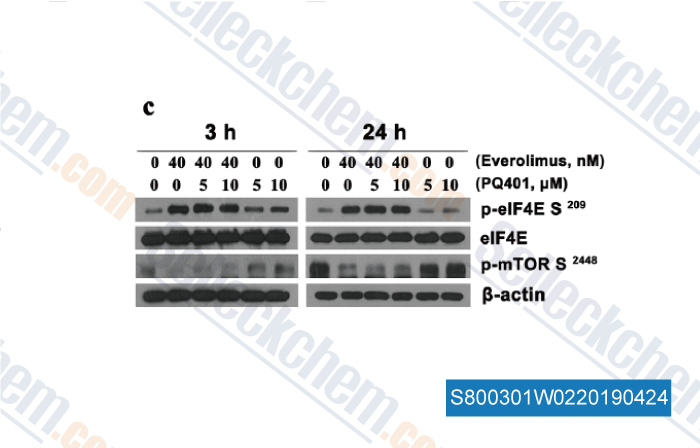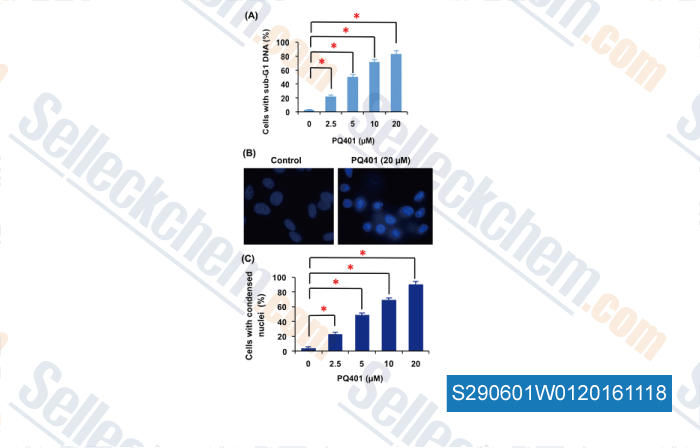|
Toll Free: (877) 796-6397 -- USA and Canada only -- |
Fax: +1-832-582-8590 Orders: +1-832-582-8158 |
Tech Support: +1-832-582-8158 Ext:3 Please provide your Order Number in the email. |
Technical Data
| Formula | C18H16ClN3O2 |
||||||
| Molecular Weight | 341.79 | CAS No. | 196868-63-0 | ||||
| Solubility (25°C)* | In vitro | DMSO | 32 mg/mL (93.62 mM) | ||||
| Water | Insoluble | ||||||
| Ethanol | Insoluble | ||||||
| In vivo (Add solvents to the product individually and in order) |
|
||||||
|
* <1 mg/ml means slightly soluble or insoluble. * Please note that Selleck tests the solubility of all compounds in-house, and the actual solubility may differ slightly from published values. This is normal and is due to slight batch-to-batch variations. * Room temperature shipping (Stability testing shows this product can be shipped without any cooling measures.) |
|||||||
Preparing Stock Solutions
Biological Activity
| Description | PQ401 inhibits autophosphorylation of IGF-1R domain with IC50 of <1 μM. | ||
|---|---|---|---|
| Targets |
|
||
| In vitro | PQ 401 is an IGF-1R inhibitor and inhibits autophosphorylation of the IGF-IR kinase domain at concentrations <100 nM, with an IC50 <1μM. PQ 401 significantly reduced proliferation of MCF-7 cells with IC50 of 8 μM. PQ 401 also inhibits growth of MCNeuA cells with IC50 of 15 μM. PQ 401 inhibits the IGF-I-mediated antiapoptotic pathway in MCF-7 cells. PQ 401 increases caspase-mediated apoptotic activity in MCF-7 cells. [1] | ||
| In vivo | PQ 401 (50 mg/Kg, 100 mg/Kg) significantly inhibits MCNeuA tumor growth in a dose-dependent manner. [1] |
Protocol (from reference)
| Kinase Assay:[1] |
|
|---|---|
| Cell Assay:[1] |
|
| Animal Study:[1] |
|
Customer Product Validation

-
Data from [Data independently produced by , , Lung Cancer, 2015, 90(2):175-81]

-
Data from [Data independently produced by , , Acta Pharmacol Sin, 2018, 39(12):1894-1901]

-
Data from [Data independently produced by , , J Chemother, 2016, 28(1):44-9.]
Selleck's PQ 401 has been cited by 3 publications
| MNK1 inhibitor CGP57380 overcomes mTOR inhibitor-induced activation of eIF4E: the mechanism of synergic killing of human T-ALL cells [Huang XB, et al. Acta Pharmacol Sin, 2018, 39(12):1894-1901] | PubMed: 30297804 |
| PQ401, an IGF-1R inhibitor, induces apoptosis and inhibits growth, proliferation and migration of glioma cells [Zhou X, et al. J Chemother, 2016, 28(1):44-9] | PubMed: 25971682 |
| Reduced expression of EI24 confers resistance to gefitinib through IGF-1R signaling in PC9 NSCLC cells [Choi JM, et al. Lung Cancer, 2015, 90(2):175-81] | PubMed: 26342551 |
RETURN POLICY
Selleck Chemical’s Unconditional Return Policy ensures a smooth online shopping experience for our customers. If you are in any way unsatisfied with your purchase, you may return any item(s) within 7 days of receiving it. In the event of product quality issues, either protocol related or product related problems, you may return any item(s) within 365 days from the original purchase date. Please follow the instructions below when returning products.
SHIPPING AND STORAGE
Selleck products are transported at room temperature. If you receive the product at room temperature, please rest assured, the Selleck Quality Inspection Department has conducted experiments to verify that the normal temperature placement of one month will not affect the biological activity of powder products. After collecting, please store the product according to the requirements described in the datasheet. Most Selleck products are stable under the recommended conditions.
NOT FOR HUMAN, VETERINARY DIAGNOSTIC OR THERAPEUTIC USE.
